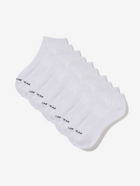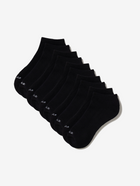In a world where fashion choices are often fleeting and disposable, Allwear stands as a beacon of change.
Welcome to a journey that explores the profound impact of natural fabrics and ethical practices as we advocate for a greener fashion future where style meets sustainability in perfect harmony.
The Problem with Fast Fashion
In the era of fast fashion, the fashion industry has inadvertently become one of the planet's largest polluters and contributors to social inequalities. The relentless pursuit of the latest trends and the rapid production cycles have resulted in significant environmental and social consequences.
From excessive water usage in cotton cultivation to harmful chemical dyeing processes, fast fashion has left a lasting negative impact on our environment.
Moreover, the unethical labor practices prevalent in many fast fashion factories have raised serious concerns about workers' rights and well-being.
Synthetic fabrics, which dominate the fast fashion landscape, are a major source of concern. These petroleum-based materials not only require vast amounts of energy to produce but also shed micro-plastics into our oceans and soil when washed.
Mass production techniques prioritize quantity over quality, leading to poorly made garments that are designed for short-term use. This disposability of clothing not only contributes to overconsumption but also adds to the mounting waste crisis.
Fast fashion's relentless churn of new styles and collections has created a culture of disposability. As consumers are enticed by cheap, trendy garments, they tend to discard their clothing items more frequently, leading to an alarming increase in textile waste.
Additionally, the energy-intensive production processes and long-distance transportation of fast fashion items significantly contribute to greenhouse gas emissions. These unsustainable practices are exacerbating climate change and depleting finite natural resources.
The Beauty of Natural Fabrics
Natural fabrics are derived from plant or animal sources and are minimally processed to retain their inherent properties.
Examples of natural fabrics include organic cotton, which is grown without synthetic pesticides or genetically modified organisms, as well as hemp, known for its durability and minimal environmental impact.
The advantages of natural fabrics in terms of sustainability
Biodegradability and Reduced Environmental Impact: Natural fabrics decompose naturally, minimizing their environmental footprint. They break down into organic matter without releasing harmful chemicals or micro-plastics into the environment.
Improved Comfort and Breathability: Natural fabrics offer superior comfort and breathability compared to synthetics. They allow the skin to breathe and regulate temperature, making them ideal for various climates and seasons.
The timeless appeal and versatility of natural fabrics in fashion
Natural fabrics possess an enduring charm that transcends seasonal trends. Their versatility allows them to be crafted into a wide range of fashion items, from casual wear like organic sweat shorts and modal crew neck tees to more formal pieces like bomber jackets.
These fabrics not only age gracefully but also offer a sense of authenticity and timelessness in an industry often marked by fleeting fads.
Durability and Longevity
Garments made from natural fabrics are renowned for their exceptional durability and longevity. Unlike their fast fashion counterparts, which often succumb to wear and tear after just a few uses, natural fabric garments can withstand the test of time.
Organic cotton, hemp, linen, and bamboo-based clothing are not only resistant to pilling and stretching but also tend to become softer and more comfortable with each wear.
By investing in clothing made from these materials, consumers can significantly reduce their fashion-related waste and contribute to a more sustainable wardrobe.
Our approach to design, focusing on timeless styles
Our brand's commitment to sustainability goes beyond using natural fabrics; it extends to our design philosophy. We prioritize creating timeless styles that transcend passing trends. By eschewing fleeting fads in favor of classic, versatile designs, our clothing becomes enduring staples in our customers' wardrobes.
Our design process involves careful consideration of not only aesthetics but also functionality and comfort. Each piece is crafted to withstand the test of time, both in terms of durability and style. We believe that sustainable fashion should be about investing in quality pieces that can be worn and cherished for years to come, reducing the need for constant replacements and contributing to a more sustainable future.
A Greener Fashion Future
Throughout this article, we've explored the critical issues plaguing the fashion industry and the positive impact that sustainable choices, particularly natural fabrics, can have.
Allwear envisions a fashion industry that prioritizes environmental and social responsibility over fleeting trends.
We believe in leading by example, showcasing the possibilities of creating beautiful, durable, and ethical clothing using sustainable fabrics. Our commitment extends beyond our products to inspire positive change in the industry as a whole.
We aim to influence the fashion landscape by encouraging transparency, ethical production, and the use of sustainable materials.
Our vision is one where consumers are empowered to make mindful choices, where waste is minimized, and where every garment tells a story of responsible creation.
It's our sincere hope that this article has inspired you to take action and become part of the solution. Supporting and embracing sustainable fashion is not just a choice; it's a powerful statement that can shape the future of the industry.



